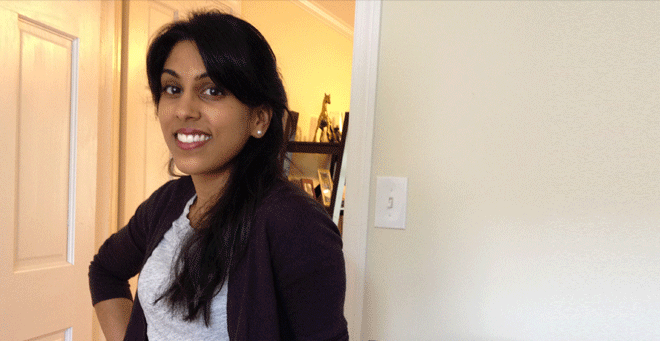 |
|
| GSBS class speaker Allie Muthukumar |
Allie Muthukumar has always been interested in science; at UMass Medical School she became fascinated by the study of glial cells. The Graduate School of Biomedical Sciences student, who will address her peers at Commencement on Sunday, May 31, as class speaker, said the research of Marc Freeman, PhD, inspired her career. Dr. Freeman, Howard Hughes Medical Institute Investigator and professor of neurobiology, is a leader in the field of glial cells.
Although they comprise more than half of human brain cells, glial cells are often overlooked by neurobiologists who predominately focus on the more widely known neurons. Experiments by Freeman have shown that glial cells are major players in the development, function and health of the nervous system.
“We know so little about glial cells, how they function and how they connect with and communicate with neurons,” said Muthukumar, an Amherst native. “The idea that there’s this whole other piece to the puzzle that’s being ignored . . . there is a lot to learn.”
As a member of Freeman’s lab, Muthukumar focused her thesis research on communication between astrocytes and neurons during neural system development, in particular the role astrocytes have in synapse development and how synaptic activity can shape astrocyte function in turn.
In October, she co-authored an article published in Nature Neuroscience with Tobias Stork, PhD, a post-doctoral researcher in Freeman’s lab, and Freeman on the activity-dependent regulation of astrocyte GAT levels during synaptogenesis.
“Working in Marc’s lab was phenomenal,” Muthukumar said.
Her interest in glial research and neuron-glia interactions remains strong. She began her post-doc work in the field in March at Boston Children’s Hospital in the lab of Beth Stevens, PhD, assistant professor of neurology with the Program in Neuroscience at Harvard University.
“The questions in Beth’s lab are being asked a little differently and the approach is different, but there is common ground,” she said, between the work she performed at UMMS and what she’s doing in the Stevens’ lab.
Muthukumar earned her undergrad degree in biology from the University of Chicago. Afterward, she worked at the National Institutes of Health in Bethesda, Md., where she developed an interest in research.
“Scientific research attracted me more as I grew older; science itself has always been a subject matter that I enjoyed . . . it is tangible to me, it makes sense and I understand the relevance,” Muthukumar said.
She said her experience in the NIH post-baccalaureate program had a strong influence on her decision to continue working in a lab and pursue a PhD at UMass Medical School. It was there that she became excited by the new approaches she witnessed scientists using to navigate through a question and try to discern the unknown.
“That is where I got my feet wet,” she said.
Muthukumar said she’s humbled to have been chosen as the GSBS student speaker and was surprised by the honor. She described UMMS—the campus, her classmates and lab colleagues—as an incredibly supportive and collaborative environment that provided a happy and enlightening experience. In her commencement address, Muthukumar will focus on the value of a transdisciplinary scientific approach.
“I feel like it all serendipitously worked out,” Muthukumar said of her initial application and visit to the Worcester campus. “I came to visit UMass and saw that the program was excellent; the labs I visited and PIs that I met were all very warm and interesting; and I was struck by the exciting research underway.”
In addition to already launching her career as a scientist, Muthukumar has recently taken another big step in her life—she married Can Kayatekin, PhD, a GSBS alumnus.